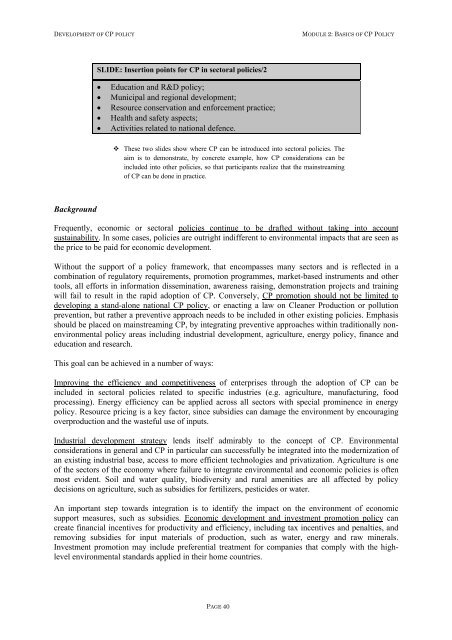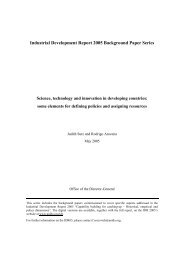Manual on the Development of Cleaner Production Policies ... - Unido
Manual on the Development of Cleaner Production Policies ... - Unido
Manual on the Development of Cleaner Production Policies ... - Unido
Create successful ePaper yourself
Turn your PDF publications into a flip-book with our unique Google optimized e-Paper software.
DEVELOPMENT OF CP POLICY<br />
MODULE 2: BASICS OF CP POLICY<br />
SLIDE: Inserti<strong>on</strong> points for CP in sectoral policies/2<br />
• Educati<strong>on</strong> and R&D policy;<br />
• Municipal and regi<strong>on</strong>al development;<br />
• Resource c<strong>on</strong>servati<strong>on</strong> and enforcement practice;<br />
• Health and safety aspects;<br />
• Activities related to nati<strong>on</strong>al defence.<br />
These two slides show where CP can be introduced into sectoral policies. The<br />
aim is to dem<strong>on</strong>strate, by c<strong>on</strong>crete example, how CP c<strong>on</strong>siderati<strong>on</strong>s can be<br />
included into o<strong>the</strong>r policies, so that participants realize that <strong>the</strong> mainstreaming<br />
<strong>of</strong> CP can be d<strong>on</strong>e in practice.<br />
Background<br />
Frequently, ec<strong>on</strong>omic or sectoral policies c<strong>on</strong>tinue to be drafted without taking into account<br />
sustainability. In some cases, policies are outright indifferent to envir<strong>on</strong>mental impacts that are seen as<br />
<strong>the</strong> price to be paid for ec<strong>on</strong>omic development.<br />
Without <strong>the</strong> support <strong>of</strong> a policy framework, that encompasses many sectors and is reflected in a<br />
combinati<strong>on</strong> <strong>of</strong> regulatory requirements, promoti<strong>on</strong> programmes, market-based instruments and o<strong>the</strong>r<br />
tools, all efforts in informati<strong>on</strong> disseminati<strong>on</strong>, awareness raising, dem<strong>on</strong>strati<strong>on</strong> projects and training<br />
will fail to result in <strong>the</strong> rapid adopti<strong>on</strong> <strong>of</strong> CP. C<strong>on</strong>versely, CP promoti<strong>on</strong> should not be limited to<br />
developing a stand-al<strong>on</strong>e nati<strong>on</strong>al CP policy, or enacting a law <strong>on</strong> <strong>Cleaner</strong> Producti<strong>on</strong> or polluti<strong>on</strong><br />
preventi<strong>on</strong>, but ra<strong>the</strong>r a preventive approach needs to be included in o<strong>the</strong>r existing policies. Emphasis<br />
should be placed <strong>on</strong> mainstreaming CP, by integrating preventive approaches within traditi<strong>on</strong>ally n<strong>on</strong>envir<strong>on</strong>mental<br />
policy areas including industrial development, agriculture, energy policy, finance and<br />
educati<strong>on</strong> and research.<br />
This goal can be achieved in a number <strong>of</strong> ways:<br />
Improving <strong>the</strong> efficiency and competitiveness <strong>of</strong> enterprises through <strong>the</strong> adopti<strong>on</strong> <strong>of</strong> CP can be<br />
included in sectoral policies related to specific industries (e.g. agriculture, manufacturing, food<br />
processing). Energy efficiency can be applied across all sectors with special prominence in energy<br />
policy. Resource pricing is a key factor, since subsidies can damage <strong>the</strong> envir<strong>on</strong>ment by encouraging<br />
overproducti<strong>on</strong> and <strong>the</strong> wasteful use <strong>of</strong> inputs.<br />
Industrial development strategy lends itself admirably to <strong>the</strong> c<strong>on</strong>cept <strong>of</strong> CP. Envir<strong>on</strong>mental<br />
c<strong>on</strong>siderati<strong>on</strong>s in general and CP in particular can successfully be integrated into <strong>the</strong> modernizati<strong>on</strong> <strong>of</strong><br />
an existing industrial base, access to more efficient technologies and privatizati<strong>on</strong>. Agriculture is <strong>on</strong>e<br />
<strong>of</strong> <strong>the</strong> sectors <strong>of</strong> <strong>the</strong> ec<strong>on</strong>omy where failure to integrate envir<strong>on</strong>mental and ec<strong>on</strong>omic policies is <strong>of</strong>ten<br />
most evident. Soil and water quality, biodiversity and rural amenities are all affected by policy<br />
decisi<strong>on</strong>s <strong>on</strong> agriculture, such as subsidies for fertilizers, pesticides or water.<br />
An important step towards integrati<strong>on</strong> is to identify <strong>the</strong> impact <strong>on</strong> <strong>the</strong> envir<strong>on</strong>ment <strong>of</strong> ec<strong>on</strong>omic<br />
support measures, such as subsidies. Ec<strong>on</strong>omic development and investment promoti<strong>on</strong> policy can<br />
create financial incentives for productivity and efficiency, including tax incentives and penalties, and<br />
removing subsidies for input materials <strong>of</strong> producti<strong>on</strong>, such as water, energy and raw minerals.<br />
Investment promoti<strong>on</strong> may include preferential treatment for companies that comply with <strong>the</strong> highlevel<br />
envir<strong>on</strong>mental standards applied in <strong>the</strong>ir home countries.<br />
PAGE 40
















